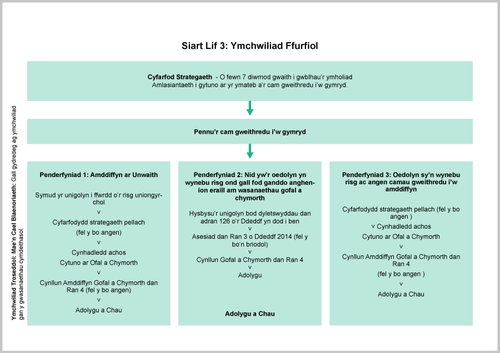Outcomes of the Strategy Discussion/ Meeting
Supported and informed decisions
Any decisions regarding safeguarding actions should:
- be justified and proportionate;
- empower the adult as far as possible to make choices;
- enable them to develop the capacity to respond to identified concerns;
- ensure their rights to safety are balanced with their rights to liberty, autonomy and family life;
- recognise the adult at risk, regardless of mental capacity may not want intrusive help and assistance or criminal proceedings initiated;
- that removal of contact from family may be experienced as abusive;
- take account of cultural and religious factors.
It is important, therefore, that practitioners ensure the adult at risk:
- Understands the practitioners’ concerns about abuse and neglect1;
- Appreciates the options available;
- Is made aware of the advantages and disadvantages of each option.

Flowchart 3: strategy meeting and what happens after a strategy meeting
Agreed plan of action
By the end of the discussion/meeting participants should have agreed a plan of action that includes:
- the concerns or allegations to be addressed;
- actions within each agency and how they will be co-ordinated such as:
- further enquiries;
- criminal investigations led by the police;
- investigation led by health;
- disciplinary procedures led by the employer;
- regulatory breach, inspection by relevant regulator.
- the involvement, support and communication needs of any adult at risk;
- risk management to ensure no one is left or placed at risk and investigations are not prejudiced;
- who will liaise with the adult at risk, and their family, about decisions reached or required and what, if any;
- any arrangements necessary to ensure the safety of practitioners;
- dates for reporting, completion and next steps.
- decide to whom the practitioners undertaking the enquiries will report, with what frequency and how progress will be reviewed;
- it is important to decide whether to reconvene a strategy meeting to:
- check on progress;
- gather more information;
- assess new information;
- examine the results of the enquiry prior to a case conference;
- roles and responsibilities of key officers including which agency and professional should undertake the investigatory role.
N.B: If a criminal investigation is taking place the police should agree what actions can be taken and when. This ensures that any criminal investigation is not compromised.
Pointers for Practice: Care and Support or Care and Support, Protection Needs?
Sharing outcomes of a strategy discussion/ meeting
The outcome of the strategy discussion/meeting should be shared with the adult at risk, unless a mental capacity assessment has indicated otherwise.
However, consideration must be given to what information is shared. Consideration should be given to:
- the possible impact on any investigation;
- the rights of others involved, including the alleged perpetrator, to confidentiality.
In practice, it is likely that at this stage it will only be possible to tell the adult at risk whether an investigation is going ahead and about the protective measures that directly affect them.
Information about the outcome may only be shared with a relative or friend of the adult at risk with their consent. Information can be shared with those who have a power of attorney or those appointed as deputy by the Court of Protection. If they are assessed not to have capacity to make this decision, a best interest decision will be made about sharing information.
If a report has been made for an Independent Mental Capacity Advocate (IMCA) for the adult at risk because they have been assessed to lack the capacity to consent to one or more protective measures, the IMCA will be informed of the outcome of the strategy discussion/meeting. Where other advocates are involved with the adult at risk those participating in the strategy discussion/meeting will decide whether they are informed and, if so, what information they are given.
Information will be shared with practitioners who have a role in the adult safeguarding process. This may include the care manager and the manager of a provider service.
The lead practitioner is responsible for ensuring that information is shared as agreed at the strategy discussion/meeting, although they may arrange for others to actually carry out the information-sharing (for example. contacting the adult at risk or their family).
If the alleged perpetrator is a practitioner, it may be necessary to contact their HR department to make them aware of any potential risks that person poses to the adult at risk or others and to discuss appropriate safeguarding action. The person’s employer cannot be instructed to take a particular course of action, but they can be made aware that they have a duty to take appropriate action to safeguard the adult at risk and others who may be deemed to be at risk and will be accountable for any decisions they make.
Professional Disagreements
If a professional disagrees with the strategy meeting decision, he/she should make representation to their own line manager and inform a senior manager responsible for safeguarding in social services and the police in order to seek an agreed consensus decision
Adult at risk and Family Disagreements
The subject of any report and/or their representative should be appropriately informed of the report and the resulting determination.
Should the individual or their representative disagree with the process followed by the local authority and the matter cannot be resolved they should be referred to the Local authority’s complaints process or the multi-agency complaints process.
Pointers for Practice: Managing Family Disagreements